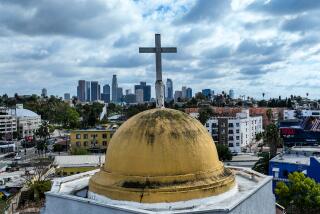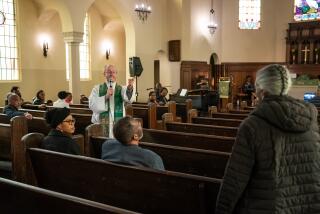Congregation Keeps a Prayerful Vigil Over East Germany’s Fate
- Share via
The worship services that the Rev. Juergen Bless holds in Huntington Beach for his tiny flock are unusual--even to the group’s fellow German-Americans.
These Sunday morning services at the Old World Community Church are in German, the only ones still held on a regular basis in Orange County.
And as part of an ethnic group that has long been one of the fastest-assimilating in America, this Huntington Beach flock is hardly a growing trend. The weekly attendance is about 40, much the same since the German-language services were first offered 10 years ago.
Most of these Old World Community Church members are German immigrants--like Bless himself--the rest their American-born children and grandchildren.
So, not surprisingly, the members of this congregation, as much as any segment of Orange County’s large German-American community, have been intensely following the stunning succession of political and social changes in East Germany.
“We are hoping that the (democratization) movement there will remain safe and become stronger. We are exhilarated by the growing possibility that Germany may at last be reunified,” Bless said in his office one Sunday, as he looked at a rack crammed with German newspapers headlining the Nov. 10 opening of the Berlin Wall and East German borders.
“We have been separated,” the 48-year-old pastor said, “for much too long.”
Then echoing what he had told his congregation that morning, he added: “We must all pray for them. We must keep a vigil for them in our hearts.”
Indeed, the pastor’s wife, Karin, is among those in the congregation who have lived especially close with the division caused by the Iron Curtain.
In 1949, when Karin was 8, she and her mother fled their home in Lyck--in a German region that had become part of Communist Poland after the war--and rejoined a sister, Gisela, who was living in Weida, East Germany.
Karin and the mother stayed in Weida until 1960, only months before the East German borders were sealed off. They then made their way to Bochum, West Germany, to rejoin other relatives.
“We felt we could stay no longer and live in a (Communist) system like that. We were very lucky--we left just in time,” recalled Karin. “But Gisela and her husband chose to stay. It had always been their home. They felt it was too hard to leave.”
Karin did not see Gisela again until 1972, when Karin made her first trip back to Weida. Then last summer, Gisela--who is in poor health--was allowed to visit her West German relatives in Bochum. There, Gisela also met with Karin and Juergen Bless and their American-born sons, Andreas, 15, and Wolf-Dieter, 13.
“Now we’re hoping Gisela can come visit us (in Huntington Beach) next year,” Karin said. “But she says the waiting list (for flights to the United States) is enormous because of the recent lifting of all travel restrictions there.”
In many ways the mood remains highly optimistic.
“The signs (in East Germany) are that democracy is winning there, that the people will be gaining the kinds of freedoms as we know it in the West,” Bless said. “Americans in particular should be gratified because these are exactly the principles and forms of free expression long nurtured by the people of this country.”
But this mood can turn somber, as in the case of a letter that Karin Bless received a few weeks ago from Gisela.
“The government election (March 18) is coming up and the idea of (German) reunification seems to be moving quite fast. But my sister still sounded so worried because everything there is so uncertain,” Karin said. “People hear that so much there can change in a flash, that so much still needs to be done.”
More to Read
Sign up for Essential California
The most important California stories and recommendations in your inbox every morning.
You may occasionally receive promotional content from the Los Angeles Times.













